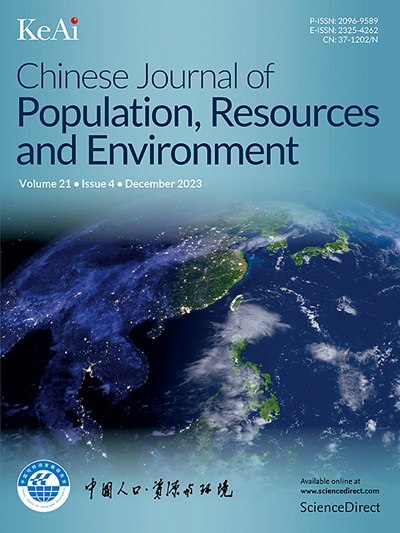Digital intelligence technology innovation, energy transformation and urban carbon emission efficiency
IF 4.8
4区 环境科学与生态学
Q2 ENVIRONMENTAL STUDIES
Chinese Journal of Population Resources and Environment
Pub Date : 2025-06-01
DOI:10.1016/j.cjpre.2025.05.006
引用次数: 0
Abstract
Strategically improving carbon emission efficiency (CEE) through digital intelligence technology innovation (DITI) is imperative to capitalize on emerging opportunities for economic decarbonization and low-carbon green development. This study employs panel data from 283 Chinese cities from 2011 to 2021 to examine the influence of DITI on urban CEE. The findings suggest the following: ① DITI is crucial in enhancing CEE, and it exerts spatial spillover effects on neighboring areas. ② Following the transition to a low-carbon energy system, DITI is instrumental in enhancing CEE by reducing the energy consumption scale, optimizing the energy consumption structure, and controlling the energy consumption intensity. ③ DITI has varying effects on CEE when subjected to multidimensional regulations, including fiscal pressure, fiscal decentralization, private economics, and entrepreneurial vitality. ④ The beneficial impact of DITI on CEE is more pronounced in regions with high economic growth, low natural resource endowments, high digital resource endowments, and in cities in central China. This study emphasizes DITI’s crucial role in promoting a low-carbon, green circular, and energy-efficient digital economy.
数字智能技术创新、能源转型与城市碳排放效率
通过数字智能技术创新(DITI)战略性地提高碳排放效率(CEE)是抓住经济脱碳和低碳绿色发展新机遇的必要举措。本研究采用2011 - 2021年283个中国城市的面板数据,考察了DITI对城市中东欧的影响。研究结果表明:①工业增加值对促进中东欧发展具有重要作用,并对周边地区产生空间溢出效应;②在向低碳能源体系转型的背景下,通过降低能源消费规模、优化能源消费结构、控制能源消费强度等方式提升能源消费水平。③受财政压力、财政分权、民营经济和创业活力等多维因素影响,DITI对中东欧的影响是不同的。④在经济高增长、自然资源禀赋低、数字资源禀赋高的地区和中部城市,数字化投资对中东欧的有利影响更为明显。本研究强调了数字信息技术在促进低碳、绿色循环和节能数字经济方面的关键作用。
本文章由计算机程序翻译,如有差异,请以英文原文为准。
求助全文
约1分钟内获得全文
求助全文
来源期刊

Chinese Journal of Population Resources and Environment
ENVIRONMENTAL STUDIES-
CiteScore
4.30
自引率
1.10%
发文量
791
审稿时长
79 days
期刊介绍:
The Chinese Journal of Population, Resources and Environment (CJPRE) is a peer-reviewed international academic journal that publishes original research in the fields of economic, population, resource, and environment studies as they relate to sustainable development. The journal aims to address and evaluate theoretical frameworks, capability building initiatives, strategic goals, ethical values, empirical research, methodologies, and techniques in the field. CJPRE began publication in 1992 and is sponsored by the Chinese Society for Sustainable Development (CSSD), the Research Center for Sustainable Development of Shandong Province, the Administrative Center for China's Agenda 21 (ACCA21), and Shandong Normal University. The Chinese title of the journal was inscribed by the former Chinese leader, Mr. Deng Xiaoping. Initially focused on China's advances in sustainable development, CJPRE now also highlights global developments from both developed and developing countries.
 求助内容:
求助内容: 应助结果提醒方式:
应助结果提醒方式:


